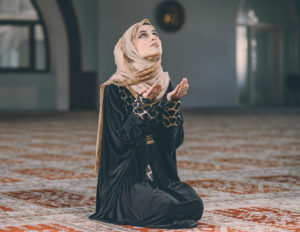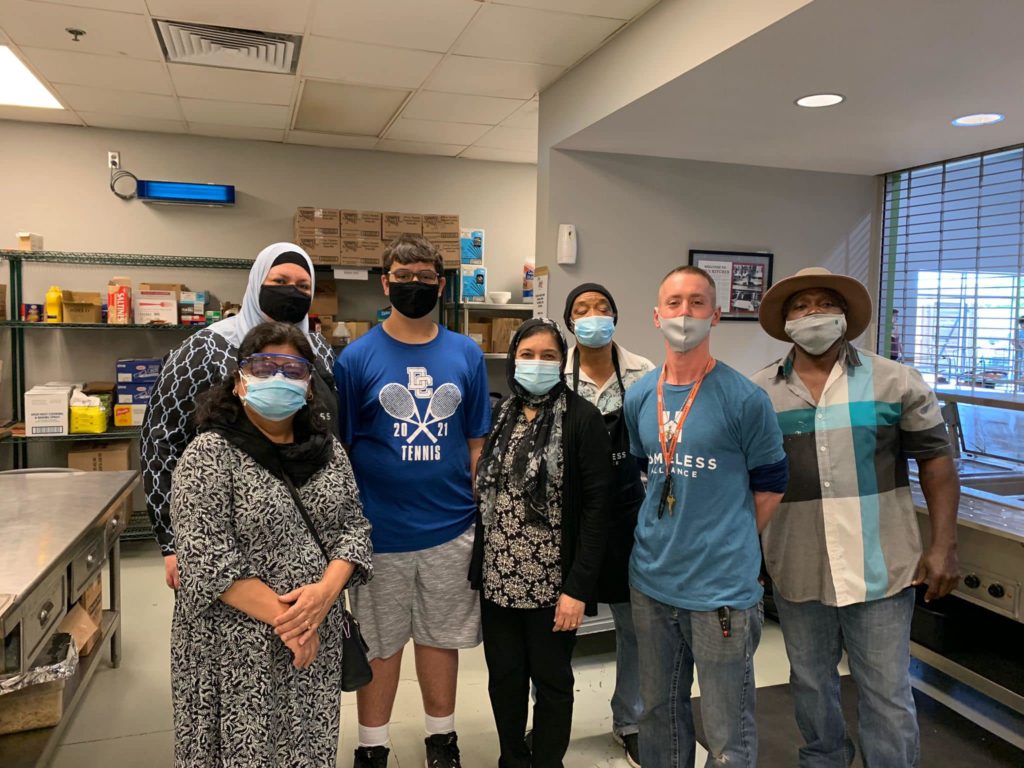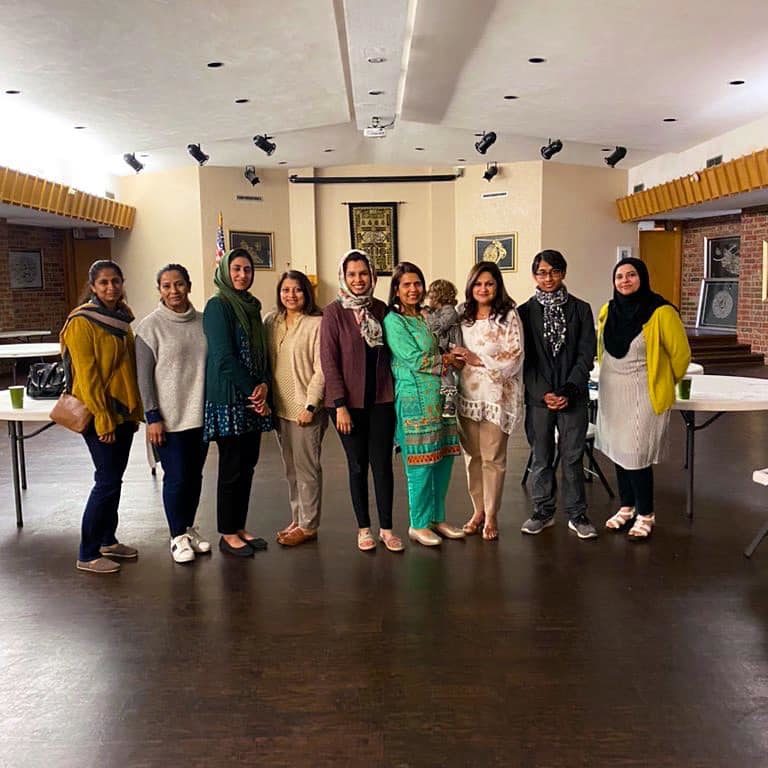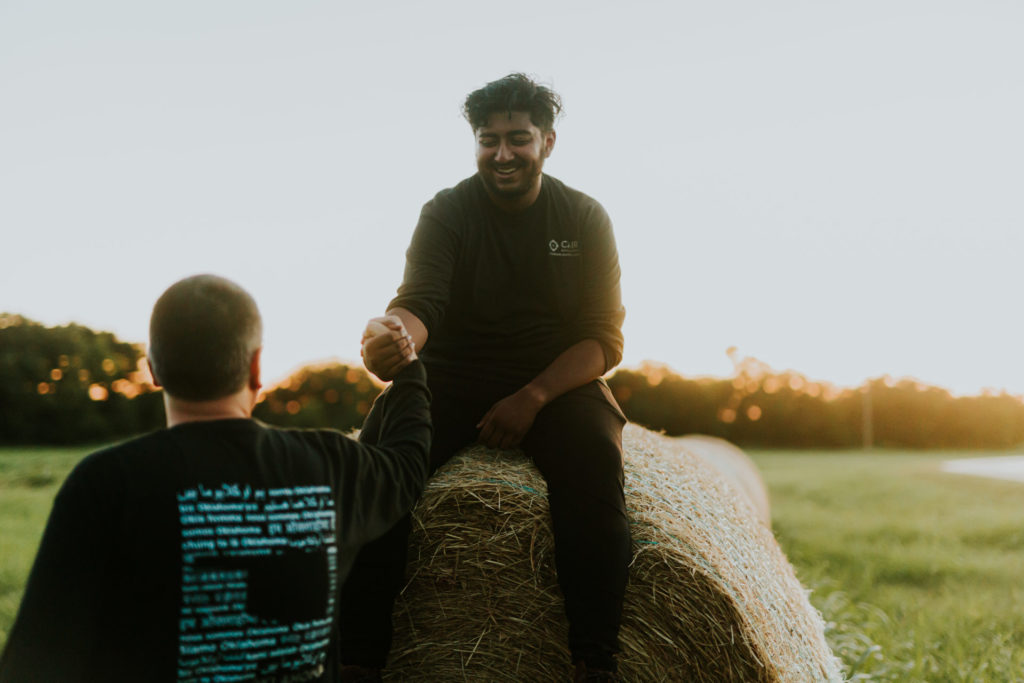Guide to Islam and Muslims in Oklahoma
Introduction
The information in this booklet is designed to assist you in having a better understanding of the Islamic faith and Muslim community in Oklahoma. It is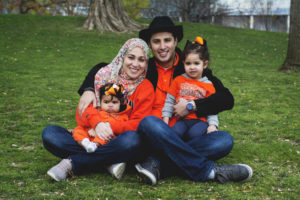 intended as a general outline of religious practices and beliefs: individual applications of these observances may vary.
intended as a general outline of religious practices and beliefs: individual applications of these observances may vary.
According to demographers, Islam is the world’s second-largest faith, with more than 1.6 billion adherents worldwide. It is the fastest-growing religion in the United States with one of the most diverse and dynamic communities, representing a variety of ethnic backgrounds, languages, and nationalities.
The Oklahoma Muslim community has been a part of the beautiful fabric of Oklahoma society for more than 60 years, beginning with the founding of what is now Masjid Mu’min (Mosque of the Believer) in the early 1960s. Over the next two decades, the influx of international students from Muslim nations led to the founding of Mosques in college towns like Stillwater, Norman, and Edmond. In the 1990s, the Oklahoma Muslim community continued to build community infrastructure by establishing the Islamic Societies of Greater Oklahoma City and Tulsa, arguably two of the most influential Muslim community centers in the state’s history. Additionally, it was during this time that humble Islamic schools were established in both Oklahoma City and Tulsa metropolitan areas which eventually grew into K-12 schools that rival the best academic institutions in the state.
In the last twenty years, the Oklahoma Muslim community has become more engaged and, as a result, more visible in all aspects of life in our state. Whether they are curing cancer, educating our young, or serving authentic culinary creations from their restaurants, the positive impact that Muslims have had on our state is undeniable. From providing important social services such as food pantries and free medical clinics, to engaging in efforts with relief agencies and assisting Oklahoma’s vulnerable, the Muslim Community has not only lived up to the Oklahoma standard, they are the Oklahoma standard.
Glossary of Muslim Terms
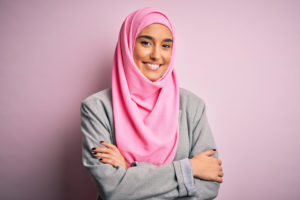 Abrahamic Faiths: a term used to refer to Judaism, Christianity, and Islam, which all recognize Abraham as their first prophet.
Abrahamic Faiths: a term used to refer to Judaism, Christianity, and Islam, which all recognize Abraham as their first prophet.
Allah: Muslims often refer to God as Allah. This is a universal name for God and does not refer to an exclusively ‘Islamic’ God. The term Allah, just like the term Eloh (Hebrew) and llah (Aramaic), is the preferred term to use when referring to the one God as it cannot be pluralized or genderized.
Hadith: A hadith is a statement of the Prophet Muhammad which was narrated by his companions and subsequently narrated to the next generation until these sayings were compiled in hadith collections.
Hijab: Clothing Muslim women wear in public: generally loose-fitting and includes a head covering.
Imam: Religious and spiritual leader of a Muslim community. The literal meaning is the person in front.
Islam: a faith and comprehensive way of life that literally means ‘peace through submission and surrendering to God.’ It provides a clear understanding of a person’s relationship with God, purpose in life, and ultimate destiny.
Ju’mah: Weekly congregational prayer on Friday.
Masjid: the Arabic term for mosque which literally translates to a ‘place of prostration.’
Muslim: someone who adopts the Islamic way of life by believing in the oneness of God and the prophethood of Muhammad. People who practice Islam are called Muslims, just like those who practice Christianity are called Christians.
Qiblah: The direction of the sacred shine of the Kab’ah in Mecca, Saudi Arabia, toward which Muslims turn five times each day when performing the daily ritual prayer.
Qu’ran: For a Muslim, the Qu’ran is the literal word of God communicated to his last Prophet and Messenger, Muhammad, through Angel Gabriel.
Ramadan: The month of fasting; a period marked by abstaining from consumption of food and drink and spousal relationships from dawn to sunset and by increased prayer and charity.
Sunnah: The teachings of the Prophet Muhammad which include his words, actions, and things he approved and disapproved of.
What Is Islam?
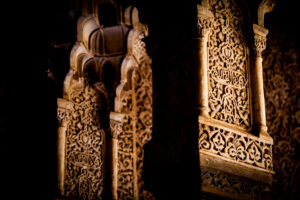 Islam is a faith system and comprehensive way of life that comes from the root word salaam, which means peace. The term Islam itself means “to achieve peace through submission to God.” A Muslim is a follower of Islam that strives to obtain peace in their life through submission to God’s teachings and divine decree. Islam is a continuation of the Abrahamic faiths that emphasize peace, justice, stewardship, and compassion. Belief in a monotheistic God, Allah, is central to the religion and helps to humble its followers to God’s merciful work throughout the Earth.
Islam is a faith system and comprehensive way of life that comes from the root word salaam, which means peace. The term Islam itself means “to achieve peace through submission to God.” A Muslim is a follower of Islam that strives to obtain peace in their life through submission to God’s teachings and divine decree. Islam is a continuation of the Abrahamic faiths that emphasize peace, justice, stewardship, and compassion. Belief in a monotheistic God, Allah, is central to the religion and helps to humble its followers to God’s merciful work throughout the Earth.
Islam, much like Christianity and Judaism, teaches that God made a covenant with Abraham to recognize God’s oneness and devote himself to the worship of God. In the Qu’ran, there are lessons regarding the obedience of Abraham to God, which Muslims are asked to emulate. Islam also teaches great reverence for Jesus as a prophet of God and one of the greatest human beings to walk the Earth.
Muslims believe in his performance of miracles (by the will of God) such as his virgin birth, that he spoke as an infant, his ability to resurrect the dead, walking on the surface of water, and that Jesus will return during the end of days.
Islamic teachings acknowledge Judaism and Christianity, their holy scriptures the Torah, the Old Testament of the Bible, and the Gospels, as well as the prophets mentioned in their scriptures, including Adam, David, Solomon, Moses, Abraham, and Jesus. One of the distinct beliefs that is different from Christianity is that Muslims do not believe Jesus is the son of God, nor does Islam teach any concept of the Holy Trinity. Islam’s core belief is in absolute monotheism (the oneness of God), and Muslims believe God has no partners in His divinity and is the creator, distinctly separate from his creation in every way.
Did you know?
The first Muslims that came to America arrived on slave boats and accounted for approximately 20% of the African slave population. This means that Islam has been a practiced religion in America for more than 400 years.
Who is Muhammad?
Muhammad, who is taught in Islam to be the last and final prophet of God, provides Muslims with an example of what to strive for, as he symbolizes piety and tolerance. He grew up in what is modern-day Saudi Arabia in the city of Mecca (Biblically the city of Paran, where Muslims believe that Ishmael and Hagar settled) where he earned the respect of his society as an individual who was truthful and trustworthy. Muhammad was illiterate, but with God’s divine intervention he was able to recite the Qu’ran and spread its word peacefully. Muhammad is a descendant of Abraham, and he viewed his mission as a continuation of the message that God sent to Moses and Jesus. The revelation that he received, transmitted from God via the Angel of Gabriel, often drew examples from the life of Abraham, Moses, and Jesus to teach moral lessons to the believers.
Muslims believe that Muhammad was a living example of what it means to follow God’s teachings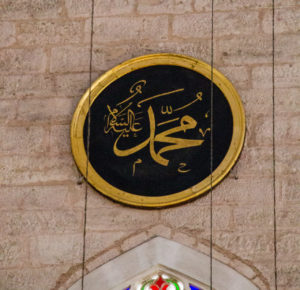 and strive to emulate his life in any way possible. Muhammad taught the importance of mercy, justice, and good moral character. His way of life, which Muslims refer to as the Sunnah, was documented in many volumes and collections called Hadith, which many scholars have dedicated their entire lives to studying. Muhammad taught his followers the importance of respecting those who practice a different faith from theirs as well as individuals that do not adhere to a faith system, promoting the idea there is no compulsion on religion.
and strive to emulate his life in any way possible. Muhammad taught the importance of mercy, justice, and good moral character. His way of life, which Muslims refer to as the Sunnah, was documented in many volumes and collections called Hadith, which many scholars have dedicated their entire lives to studying. Muhammad taught his followers the importance of respecting those who practice a different faith from theirs as well as individuals that do not adhere to a faith system, promoting the idea there is no compulsion on religion.
There is no compulsion in religion: true guidance has become distinct from error,
so whoever rejects false gods and believes in God has grasped the firmest handhold, one that will never break. God is all hearing and all knowing. [Holy Qur’an:
Chapter 2, Verse 256]
Muhammad taught that both personal and collective peace is the aim of Islam’s teachings, instructing Muslims to never engage in quarrels with other people or oppress them.
He once said to his companions:
Do you know what is better than charity and fasting and prayer? It is keeping peace and good relations between people, as quarrels and bad feelings destroy mankind. [Hadith collection of Jami` at-Tirmidhi Vol. 4, Book 35, Hadith 2509]
Muhammad also taught the significance of taking care of elders and providing aid to the poor and the needy. He also instructed believers to always engage in good conduct and trust in God’s divine wisdom in times of difficulty.
He emphasized that Muslims should uphold justice in all aspects of life for all people. He made it very clear that believers are to never engage in racism, classism, or sexism, and he instructed believers to treat one another as brothers and sisters, regardless of culture or ethnic background.
Did you know?
Muslims respect the name of Muhammad by following it with the saying sallallahu alaihi wasallam, which means “peace be upon him,” after speaking or writing his name. In Islam, it is also encouraged to follow the name of other prophets such as Moses and Jesus by utilizing the same saying.
Examples of Sayings of Prophet Muhammad
Islam has two primary sources. First is the Qurʾan which is the direct word of God inspired to the Prophet Muhammad. The second source is the Prophet’s teachings. These teachings include his words, actions, and things he approved of. The Prophet’s teachings are called Sunna. The Sunna is found in texts called ḥadīth. A ḥadīth is a statement of the Prophet Muhammad which was narrated by his companions and subsequently narrated to the next generation until these sayings were compiled in ḥadīth collections.
The following are examples of some of the hadiths of the Prophet Muhammad.
“The best among you are those who have the best manners and character.”(Hadith Collection, Sahih al-Bukhari 6029)
“He is not a true believer who eats his fill while his neighbor is hungry. “(al-Sunan al-Kubra 19049)
“You do not do evil to those who do evil to you, but you should deal with them with forgiveness and kindness.”(Hadith Collection, Sahih al-Bukhari 2125)
“The best of you are those who are best to their women.”(Hadith Collection, Sunan Al-Thirmidi 1162)
“Those people who show no mercy will receive no mercy from Allah” (Hadith Collection, Sahih Muslim).
“Not one of you can (truly) believe if you do not want for your (believing) brother what you want for yourself” (Hadith Collection, Bukhari).
“When a human being dies all their actions and blessings come to an end, except for these three things: continuous charity, the knowledge from which they have benefited others, and a blessed child who prays for them” (Hadith Collection, Sahih Muslim).
What is the Qur'an?
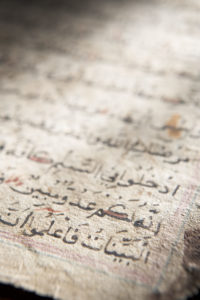 The Qur’an is Islam’s book of manners, ethics, and values. It validates the Abrahamic scriptures that come before it by highlighting the lives of Abraham, Isaac, Ishmael, Moses, Jesus, and Mary. The Qu’ran also seeks to make its message unique by emphasizing the five pillars of Islam and total monotheism. The Qur’ans thematic arrangement allows for each chapter to highlight a specific idea while remaining under the overarching banner of stewardship, justice, and compassion.
The Qur’an is Islam’s book of manners, ethics, and values. It validates the Abrahamic scriptures that come before it by highlighting the lives of Abraham, Isaac, Ishmael, Moses, Jesus, and Mary. The Qu’ran also seeks to make its message unique by emphasizing the five pillars of Islam and total monotheism. The Qur’ans thematic arrangement allows for each chapter to highlight a specific idea while remaining under the overarching banner of stewardship, justice, and compassion.
The Qur’an on justice:
God commands you[people] to return things entrusted to you to their rightful owners, and, if you judge between people, to do so with justice: God’s instructions to you are excellent, for he hears and sees everything. [Holy Qu’ran: Chapter 4, Verse 58]
You who believe, uphold justice, and bear witness to God, even if it is against yourselves, your parents, or your close relatives. Whether the person is rich or poor, God can best take care of both. Refrain from following your own desire, so that you can act justly – if you distort or neglect justice, God is fully aware of what you do.[Holy Qur’an: Chapter 4, Verse 135]
You who believe, be steadfast in your devotion to God and bear witness impartially: do not let the hatred of others lead you away from justice, but adhere to justice, for that is closer to awareness of God. Be mindful of God; God is well aware of all that you do. [Holy Qur’an: Chapter 5: Verse 8]
The Qur’an on racial and ethnic diversity:
People, we created you all from a single man and a single woman and made you into races and tribes so that you should recognize one another. In God’s eyes, the most honored of you are the ones most mindful of Him: God is all-knowing, all-aware. [Holy Qur’an: Chapter 49, Verse 13]
Another of his Signs is the creation of the heavens and earth, and the diversity of your languages and colors. There truly are signs in this for those who know. [Holy Qur’an: Chapter 30, Verse 22]
The Qur’an on mercy and compassion:
He is God: there is no god other than Him. It is he who knows what is hidden as well as what is in the open. He is the Lord of Mercy, the Giver of Mercy [Holy Qur’an: Chapter 59, Verse 22]
Good and evil cannot be equal. [Prophet], repel evil with what is better and your enemy will become as close as an old and valued friend. [Holy Qur’an: Chapter 41, Verse 34]
The Qur’an on the sanctity of life:
“On account of [his deed], we decreed to the Children of Israel that if anyone kills a person – unless in retribution for murder or spreading corruption in the land – it is as if he kills all mankind, while if any saves a life it as if he saves the lives of all mankind. Our messengers came to them with clear signs, but many of them continued to commit excesses in the land. [Holy Qur’an: Chapter 5, Verse 32]
“Say, ‘Come! I will tell you what your Lord has really forbidden you. Do not ascribe anything as a partner to Him; be good to your parents; do not kill your children in fear of poverty’ – We will provide for you and them – ‘stay well away from committing obscenities, whether openly or in secret; do not take the life of God has made sacred, except by right. This is what he commands you to do: perhaps you will use your reason. [Holy Qur’an: Chapter 6, Verse 151]
How Does a Muslim Practice Their Faith?
A Muslim is someone who submits to the will of Allah. Muslims do this by advocating for peace, understanding, and compassion. The five pillars of Islam help Muslims incorporate the religion in all aspects of their lives.
“On the authority of Abu Abdul Rahman Abdullah, the son of Umar ibn al-Khattaab who said: I heard the Messenger of Allah say: ‘Islam is built upon five [pillars]: testifying that there is none worthy of worship except Allah and that Muhammad is the Messenger of Allah, establishing the prayers, giving zakat, making pilgrimage to the House and fasting the month of Ramadan.'” (Narrated by al-Bukhari, 8; Muslim, 16)
Shahada(Profession of Faith): The declaration of faith is called the Shahadah, a simple formula that all the faithful pronounce. The significance of this declaration is the belief that the only purpose of life is to serve and obey God, and this is achieved through the teachings and practices of the last prophet, Muhammad.
The testimony of the faith is as follows: “There is none worthy of worship except God(Allah) and Muhammad is the messenger of God. “
Salat(Prayer): Muslims perform five daily prayers that remind them to serve God in all their actions. These prayers are spaced throughout the day in accordance with Islamic teachings to provide a consistent reminder of God’s presence in one’s life.
- Fajr: Dawn prayer
- Zuhr: Noon prayer
- Asr: Late afternoon prayer
- Maghrib: Sunset prayer
- Eisha: Night prayer
Each prayer takes approximately 5-10 minutes to perform, during which the individual praying cannot be disturbed or respond to questions except in cases of emergency. Prayers can be done alone or collectively as a group and can take place anywhere that is clean, and that faces the Qiblah (the direction that points towards Mecca). The daily prayers follow the cycle of the sun; therefore, the timings will vary throughout the year.
Take care to do your prayers, praying in the best way, and stand before God in
devotion. [Holy Qur’an: Chapter 2, Verse 238]
Zakat (Charity): Each year, Muslims with accumulated wealth above the level of poverty are obligated to give 2.5% of their yearly savings to the less fortunate. This focus on charity is heavily on Islam’s teachings to protect the needy and allow for equilibrium in society.
Keep up the prayer and pay the prescribed alms. Whatever good you store up for yourselves, you will find it with God: He sees everything you do. [Holy Qur’an: Chapter 2, Verse 110]
Sawm (Fasting): During the Islamic month of Ramadan, Muslims fast from dawn to sunset as an act of selfless worship in order to purify their minds and direct their attention to God. Islam teaches that fasting is done to show obedience to God, to increase spirituality and strengthen moral discipline, and to help foster empathy for those less fortunate. Fasting also allows one to deepen reflection and increase one’s connection with God and the Holy Qur’an, which Muslims believe was the first revealed to the Prophet Muhammad during this month.
You who believe, fasting is prescribed for you, as it was prescribed for those before you, so that you may be mindful of God. [Holy Qur’an: Chapter 2, Verse 183]
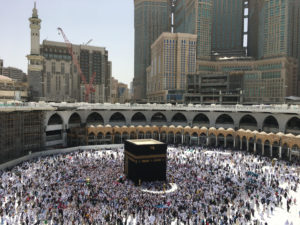 Hajj (Pilgrimage): The pilgrimage to Mecca is a once-in-a-lifetime obligation for Muslims. It works to strengthen a Muslim’s relationship with Allah, as well as to create solidarity between fellow Muslims. Hajj is obligated only to adults that are only physically and financially capable of undertaking the journey. The acts that one partakes in while on the pilgrimage are based on the life of the Prophet Muhammad and have roots that trace back to the time of Abraham. Each year, millions of pilgrims visit Islam’s holiest site to pay respects to the prophets and honor God’s teachings.
Hajj (Pilgrimage): The pilgrimage to Mecca is a once-in-a-lifetime obligation for Muslims. It works to strengthen a Muslim’s relationship with Allah, as well as to create solidarity between fellow Muslims. Hajj is obligated only to adults that are only physically and financially capable of undertaking the journey. The acts that one partakes in while on the pilgrimage are based on the life of the Prophet Muhammad and have roots that trace back to the time of Abraham. Each year, millions of pilgrims visit Islam’s holiest site to pay respects to the prophets and honor God’s teachings.
Did you know?
The Islamic calendar began when the Prophet Muhammad migrated (referred to as Hijrah) and is commonly referred to as the Hirji calendar. Given that the Hijri calendar follows the lunar cycle which is approximately 354 days long per year, the months move back 11 days annually. For that reason, the holy month of Ramadan as well as the Hajj timings change year by year.
What Do Muslims Believe?
A Muslim believes in six articles of faith that must be adhered to in every aspect of his or her life. They include belief in Allah and his eternal oneness, his status as the sole creator of all his existence, and the worship of none but God. A Muslim must believe in the Angels as God’s creation, created for the purpose of serving Allah. A Muslim believes in God’s revealed books, including the Torah revealed to Moses, the Gospel revealed to Jesus, and the Qu’ran revealed to Muhammad.
In addition, Muslims believe in all prophets sent by God, beginning with the first man, Adam, and ending with the final messenger, Muhammad. Muslims believe in the day of judgment (also referred to as the day of resurrection), which is a day that all of humanity will answer to God for the good and bad deeds they put forth in their life. Lastly, Muslims believe in God’s divine decree, and wisdom, that everything that has or will happen has already been decided by God, and that all experiences we go through are limited in scope but have the wisdom of God behind them.
What is Shariah?
 The question of what Shariah is and the impact it has on Oklahoma and the United States has been a topic of much debate, which culminated in the passage of State Question 755 (SQ 755), the “anti-Shariah” amendment, in 2010. Oklahoma voters were presented with a ballot initiative that was designed to target Muslims by banning Oklahoma courts from considering any foreign law, including “Sharia law”, when deciding cases. SQ 755 was enjoined and found to be unconstitutional in a decision upheld by the 10th Circuit Court of Appeals, and thus it never took effect.
The question of what Shariah is and the impact it has on Oklahoma and the United States has been a topic of much debate, which culminated in the passage of State Question 755 (SQ 755), the “anti-Shariah” amendment, in 2010. Oklahoma voters were presented with a ballot initiative that was designed to target Muslims by banning Oklahoma courts from considering any foreign law, including “Sharia law”, when deciding cases. SQ 755 was enjoined and found to be unconstitutional in a decision upheld by the 10th Circuit Court of Appeals, and thus it never took effect.
Shariah (also spelled Sharia) is an Arabic term that literally means a path to be followed, commonly referred to as a path of water. It is a broad term that encompasses both a personal moral code and religious law. Shariah has to be interpreted by man in a process of jurisprudential analysis known as fiqh, which means understanding.
Shariah is an integral part of Islam. It is often defined as “Islamic law.” However, Shariah encompasses much more than the conventional understanding of the law. While Shariah provides the legal framework for the foundation and functioning of society, it also details moral, ethical, social, and political codes of conduct for Muslims at an individual and collective level. It is not intended to supersede the laws of the society in which it is transplanted, so Shariah law is never used above existing American legal structures such as state law, federal law, or judicial precedent. The only times it would be applied in an American court of law would be in the construction of wills and the determination of inheritance of certain property according to Islamic law.
Shariah is derived from the scholarly study of Islamic texts. These texts include the final revelation from God (Qu’ran) and the recorded teachings of Prophet Muhammad (Sunnah), which are timeless and of divine origin. However, scholars derive specific rulings from the revealed texts by using human effort and interpretation, taking into account the surrounding context. As such, Shariah relies on scholarly consensus, legal analogy, and interpretative reasoning in deciding rulings. Hence, there are areas of Shariah where the scholars unanimously agree due to clearly defined evidence and areas where disagreements exist. This flexibility enables Shariah to maintain its applicability and relevance in the light of changing social, cultural, and historical circumstances while remaining faithful to the guiding principles of Shariah and its core objectives.
Demographics
Oklahoma’s Muslim community is one of the most diverse communities in the entire state comprised of more than 70 different ethnicities including converts to the Islamic faith from white, black, Hispanic, and indigenous cultures. Local publications have described the Oklahoma Muslim community as strong and growing in Oklahoma and a community that has faith amid fear, while continuing their long-standing tradition of community outreach.
Did you Know?
There are approximately 35,000 – 40,000 Muslims living in Okalhoma with more than 12,000 living in the Oklahoma City Metropolitan area.
- Around 3.45 Muslims live in the United States – around 1.1% of the total population.
- Researchers estimate that the U.S Muslim population will reach 8.1 million, or 2.1% of the nation’s total population, by 2050.
- Black Muslims account for one-fifth of all Muslims in America and about half are converts to Islam. In total, about 2% of Black Americans are Muslim.
- Roughly eight in ten Muslims(78%) say they have always been Muslim, while 21% converted to Islam.
- Nearly two-thirds of U.S. Muslims(65%) say that religion is very important in their lives, similar to the share of U.S Christians who say the same(68%).
- Four in ten (43%) Muslim Americans say they attend a mosque at least once a week, including 18% who say they attend more than once a week.
- A majority of US Muslims(65%) say religion is “very important” in their lives, while fewer say religion is “not too” (8%) or “not at all”(5%) important.
- The percentage of U.S Muslim women who say they wear the hijab all the time in public has remained steady over the past decade: About four in ten say they always wear the head cover or hijab in public(38%) or that they do so most of the time(5%). About 15% say they wear hijab some of the time, and 42% say they never wear it.
Oklahoma Facts
 The following information comes from a 2017 Oklahoma Muslims Demographic Survey with over 500 respondents from 225 households conducted by CAIR Oklahoma, the Islamic Council of Oklahoma, and the Community Services Council of Eastern Oklahoma.
The following information comes from a 2017 Oklahoma Muslims Demographic Survey with over 500 respondents from 225 households conducted by CAIR Oklahoma, the Islamic Council of Oklahoma, and the Community Services Council of Eastern Oklahoma.
Did you know?
Islam is one of the most diverse religions locally, nationally, and globally.
- There are a total of 12 Islamic centers and mosques in Oklahoma, with six in the Oklahoma City metropolitan area, two in Tulsa, two in Lawton, and one each in Stillwater and Ardmore.
- One single mosque in Oklahoma City, the Islamic Society of Greater OKC, comprises over 72 different ethnicities and dozens of languages. At Tulsa’s Islamic Society of Tulsa, members come from 43 nations and 3 Native American tribes.
- Muslims are approximately 1% of the Oklahoma population.
- 76% of Oklahoma Muslims volunteer in their community for at least 10 hours a month.
- 93% of registered Oklahoma Muslim voters voted in the last presidential election.
- 64% of Oklahoma’s Muslim population have a minimum of a bachelor’s degree.
- 61% of Oklahoma’s Muslim population have full-time employment in a variety of fields including healthcare, education, engineering, nonprofits, finance/real estate, and retail.
- 37% of Oklahoma’s Muslim population report having experienced harassment or discrimination in the past year.
Did you know?
The oldest mosque in the state of Oklahoma is Masjid Mumin, which was founded in 1964 as a Nation of Islam temple and converted into an orthodox mosque in the 1970s.
Islamic Centers and Schools
The following information was compiled and/or paraphrased from websites, social media accounts, and informational brochures created or managed by each Islamic center or organization.
Oklahoma City Metro Area
The Islamic Society of Greater Oklahoma City
Visit their website at http://www.isgoc.com/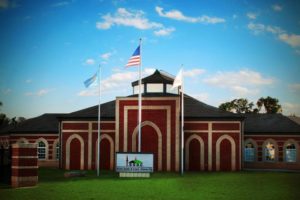
The mission of the Islamic Society of Greater Oklahoma is to deliver the balanced message of Islam through innovative methods of Dawah(outreach) and reach out to people of faith at the local, national and international level.
ISGOC was established in 1997 in the heart of Oklahoma City. Founded by a group of local Muslims, ISGOC has grown to become the largest Islamic center in the state of Oklahoma, servicing Muslims throughout Oklahoma City, and surrounding areas. ISGOC is a full time Islamic center, offering services for Muslims and individuals of all faiths. In addition to the daily prayers and Friday congregational prayers. ISGOC offers classes in the basics of Islam, fiqh(philosophy of Islamic law), the life of Prophet Muhammad, and more. ISGOC has an excellent outreach program specializing in introductory topics of Islam for those wanting to learn about Islam for the first time.
The American Muslim Association of Oklahoma
View their website at https://www.amaokc.com/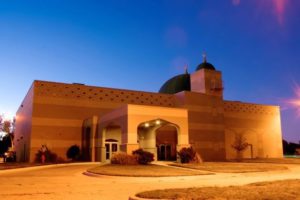
The Grand Mosque, located in the heart of Oklahoma City, is a state of the art mosque managed by the American Muslim Association of Oklahoma (AMA). The AMA has been leading the Muslim community of Oklahoma since the mid-1980s, opening the Grand Mosque facilities in 2003. The Grand Mosque holds prayer service five times daily along with nightly tafseer (Quran study) programs. In addition, we provide religious education classes covering the fundamentals of Islam for both adults and children, with Quran readings for children every weekend. Services and celebrations for Islamic holidays are also held on a regular basis.
In addition to the services provided through our mosque, we also have an event center on campus to host funeral services, marriages, and other community gatherings. Our event center is also available for rent to the general public for public and private gatherings of all kinds.
The American Muslim Association works to bring together the Muslim community of Oklahoma through the teachings and values of Islam.
We aim to promote inter-faith peace and dialogue through cultural and religious understanding.
Masjid Mumin
Visit their website at https://masjidmuminokc.org/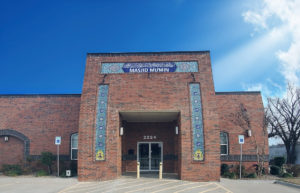
Masjid Mu’min was founded in the 1960s. It is Oklahoma’s oldest and most historic Muslim community. Masjid Mu’min began as Temple #50 in the Nation of Islam under the leadership of the Honorable Elijah Muhammad. Masjid Mu’min transitioned to the universal message of Islam with the passing of the Honorable Elijah Muhammad. The community then began following Imam W. Deen Mohammad, the eminent Muslim American Scholar and pioneer of Islam in the United States in the African American community. In 1972, the property at 1322 NE 23rd Street was purchased and converted into a mosque. Today, it remains the home of Masjid Mu’min.
Masjid Mu’min has a strong history of dynamic leadership. Since 1975 all of the Imams at Masjid Mu’min were students of Imam W. Deen Mohammed. Each Imam’s administration experienced unique and progressive accomplishments. The list of Imams who have served at Masjid Mu’min are as follows: Imam Jihaad Ahmad, Imam Al-Deen, Imam Hatim-Hamidullah, Imam Qaiyum Addul-Raheem, Imam-Ja-mal Abdul-Aziz, Imam Arif Abdullah.
The Islamic Society of Edmond
Follow the Islamic Society of Edmond on Facebook at https://www.facebook.com/edmondmasjid/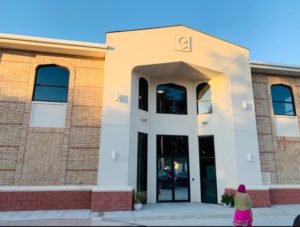
The mission of the Islamic Society of Edmond is to form trusting relationships with the communities and people they serve.
The Islamic Society of Edmond was established in the 1990 and it is the only mosque that serves Muslims in Edmond. It resides within walking distance of the University of the Central Oklahoma. It was founded to serve students at the university and residents of the city of Edmond. The mosque hosts daily prayers, weekly Jumah prayer, and many other social, educational, and religious events. An expansion to the Islamic Society of Edmond was completed in 2018.
The Islamic Society of Norman
Visit their website at https://isnok.org/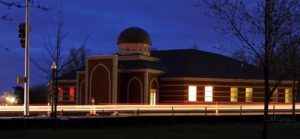
The Islamic Society of Norman was founded in 1976 and it is a unique, tight-knit community of Muslims with diverse backgrounds from all over the world. It was founded to serve students at the nearby University of Oklahoma and residents of the City of Norman. The society hosts daily prayers, weekly Jumah prayer, and many other social, educational, and religious events.
Crossroads Islamic Center of Oklahoma
The CrossRoads Islamic Center of Oklahoma is committed to establishing and maintaining a facility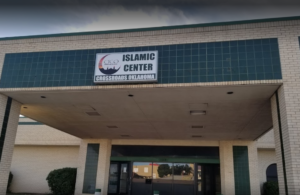 for Muslim worship in Oklahoma City. They are located right off I-35 in south Oklahoma City for spiritual, educational, and social needs. They serve the needs of the community through worship, charity, education, and civic engagement. Their practicing principles are moderation, tolerance, and inclusiveness within the structural limits of the Qu’ran and Sunnah.
for Muslim worship in Oklahoma City. They are located right off I-35 in south Oklahoma City for spiritual, educational, and social needs. They serve the needs of the community through worship, charity, education, and civic engagement. Their practicing principles are moderation, tolerance, and inclusiveness within the structural limits of the Qu’ran and Sunnah.
The Islamic center, located next to the Old CrossRoads Mall, currently holds Junnah prayer and five daily prayers along with social gatherings and educational activities on the weekends.
Mercy School Institute
Visit their website at https://www.mercyschool.com/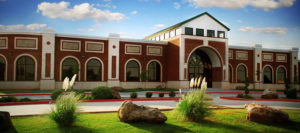
Mercy School aims to nurture confident and committed youth, who draw upon Islamic values, cultivating leaders of righteous and noble character who contribute to the betterment of our American Society. To this end, we will cultivate personalities who upon graduation will be ambitious yet responsible, competitive yet caring, practical yet reflective, open minded yet principled, motivated yet focused and progressive yet aware.
In 1999, a few people in Oklahoma City’s Muslim community got together and expressed their need for an Islamic institution for their children. They wanted someplace where their kids would be exposed to Islamic values five days a week, not just at Saturday School at their local mosque.
This group of people worked together and established Mercy School Institute in a small office building.
With only about 12 students in its first year, Mercy School Institute gradually expanded and advanced as more people in the Muslim community began sending their children and supporting this noble cause.
Around 2002, Mercy School shifted to another location nearby, a slightly larger office building. Here, a total of around 100 students attended this institution.
As the student population grew each year, the talk of a new building arose. Five acres of land was donated, plans were drawn out, and funds were steadily collected.
Finally, in 2005, construction began, and the ground breaking ceremony was held.
In 2010, the building was completed, and the first day of school that year was held in the brand new building.
Mercy School, which started out as a small office building with only 12 students, has now expanded into a beautiful, spacious, new building with a student population of over 200 students.
Stillwater
The Islamic Society of Stillwater
Visit their website at http://isstillwater.org/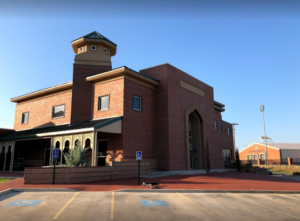
Islamic Society of Stillwater, known as ISS, has been around for decades. Muslims purchases two small homes years ago and used them to perform prayers and other Islamic activities. Recently the Stillwater masjid was rebuilt in a beautiful new building. This facility is the only one around for miles and is the place of worship for hundreds of Stillwater residents.
Decades ago, when the first Muslims arrived in Stillwater, they established the Islamic Society of Stillwater. They also purchased an existing single-family house in close proximity to the university and used it as a masjid to perform prayers and to hold social and cultural activities.
ISS has been housed in two old, residential-style buildings bought decades ago. Since then, the masjid has experienced growth after the recent construction of a new masjid and an Islamic Center. The new Islamic center is not only vital to muslims in the area but also contribute to cultural diversity.
The Islamic Society of Stillwater has been recognized more than once for its services to the local community by the City of Stillwater. The certificate highlights the efforts of ISS to promote understanding and friendly relations between Muslims and non-Muslims by sponsoring visits with churches, schools, the general public and through participation in interfaith activities.
- Islamic Day Certificate in 2000
- Islamic Awareness Day Certificate in 2017
Lawton
American Muslim Association of Lawton
The mission of the American Muslim Association of Lawton is to strengthen the faith of the Muslims of the association and establish and maintain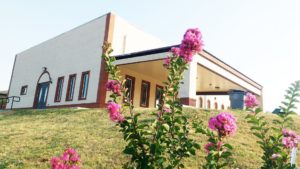 effective and efficient relations with the local community. Prior to the permanent mosque which they currently worship in, the AMAL rented a store-front space that they used as a place of worship. Their permanent mosque structure is over 3,000 square feet, offers daily prayers, weekly Jumah prayer, educational, and social opportunities.
effective and efficient relations with the local community. Prior to the permanent mosque which they currently worship in, the AMAL rented a store-front space that they used as a place of worship. Their permanent mosque structure is over 3,000 square feet, offers daily prayers, weekly Jumah prayer, educational, and social opportunities.
The Muslim community in Lawton has existed since the late 1970s, first using various meeting rooms at Fort Sill for religious classes and gatherings. There are about 40 Muslim families in the area and Muslim soldiers from Fort Sill that attend prayer services at the AMAL Mosque on a regular basis.
Ardmore
Visit their website at http://www.icaok.org/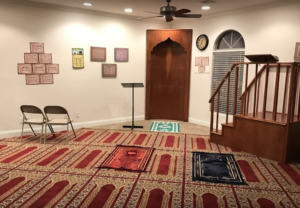
The Islamic Center of Ardmore is located just two and a half miles East of InterState 35 in Ardmore, Oklahoma. The current mosque opened in 2011 after the local Muslim community purchased an old office building that was renovated to be used as a place of worship. Approximately 30 men and women pray Jumah on a weekly basis. The mosque does regular family gatherings for community members to socialize and offers Ramadan activities.
Tulsa Metropolitan Area
The Islamic Society of Tulsa
Visit their website at https://istulsa.org/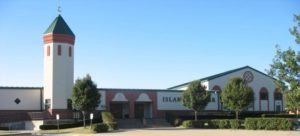
The mission of the Islamic Society of Tulsa is to support the local Muslim community and and its spiritual development, provide education, and help build a stronger, more wholesome and successful Tulsa community through interfaith dialogue, community volunteerism, and helping the needy.
It is estimated that between 6,000 – 8,000 Muslims live in the greater Tulsa area. Over 1,000 worshippers visit the Islamic Society of Tulsa on a weekly basis and around 800 attend Friday prayer. The Islamic Society is diverse in its membership; roughly 35% of local Muslims have roots from East Asian countries, 30% are from Arab countries, and another 25% are African American with origins dating back to the 1700s. The remaining 10% are converts from a multitude of backgrounds. Though their heritage is diverse, over 50% of Tulsa Muslims are American born and their political views are equally diverse.
The Islamic Society’s “Community Outreach Programs” promote peace, community, and intelligent dialogue between local Muslims and the Tulsa community at large. They offer mosque tours and public educational programs. Each summer they host a “Know Your Muslim Neighbor” lecture series where they open their doors and invite their neighbors in for fun ethnic food, tours, and guest speakers. In addition, the Islamic Society hosts a variety of special public events.
The University of Tulsa Mosque
Muslim students began arriving on the campus of the University of Tulsa (TU) in the late 1970s and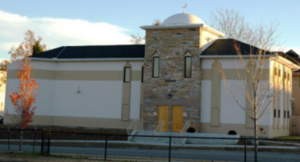 early 1980s. The Muslim Student Association of TU(MSA) was formed and began working on plans to provide a place for Muslim Students to perform their obligatory prayers. At one point, a corner of the Allen Chapman Activity Center was reserved for TU-MSU, but it did not last long as a place of prayer. In 1998, however, MSA-TU was allowed to use the old ROTC building on the south side of campus as a temporary prayer space. The building was slated for demolition but was usable until a permanent solution could be found. The prayer house actually provided a nice home for TU Muslim students until 2004 after the construction of the TU Mosque was completed.
early 1980s. The Muslim Student Association of TU(MSA) was formed and began working on plans to provide a place for Muslim Students to perform their obligatory prayers. At one point, a corner of the Allen Chapman Activity Center was reserved for TU-MSU, but it did not last long as a place of prayer. In 1998, however, MSA-TU was allowed to use the old ROTC building on the south side of campus as a temporary prayer space. The building was slated for demolition but was usable until a permanent solution could be found. The prayer house actually provided a nice home for TU Muslim students until 2004 after the construction of the TU Mosque was completed.
Peace Academy
Visit their website at https://patulsa.org/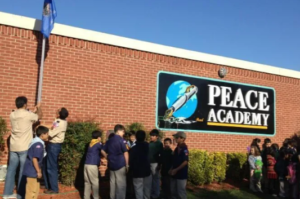
During the month of Ramadan in 1989, a handful of community members decided to open an Islamic school for the Muslim community of Tulsa. The incorporation papers and non-profit 5013-C status followed. Peace Academy opened its doors as Peace Elementary in 1990 and rented its facility from the Tulsa Public Schools. In 1998, the school had grown to include a middle school, and the name was changed to Peace Academy so that all levels of education could be included. In 1997, Peace Academy bought its building and grounds from Tulsa Public Schools, and a new mosque was erected next door for worship. The school then underwent extensive renovations for the safety and comfort of our students. In May of 2005, Peace Academy witnessed its first graduating class. Since then, we have graduated ten classes. In 2009, we earned regional accreditation from the largest accrediting body in the world, AdvancEd. We have been engaged in a process of systematic continuous improvement ever since. We were re-accredited by AdvancED in 2014. Finally, we are proud to see the majority of our alumni returning to our school as volunteers, employees, and helpers in continuing the legacy of Peace Academy.
Peace Academy is a full-time, non-profit, private, Islamic school. It is located in mid-Tulsa and services a diverse population that commutes from many different areas both in and outside of the city. Our student body is made of mostly first-generation Americans with immigrant parents from different parts of the world including Africa, Indonesia, Jordan, Palestine, Syria, Iraq, Libya, Egypt, Philippines, Mexico, and South Asia. There are 221 students enrolled at Peace Academy in 2017-2018. Of the 221 projected students, 123 are girls, and 98 are boys.
Peace Academy is located at 4620 S. Irvington Ave. Tulsa, Oklahoma 74135. Currently, our school building offers 36,000 interior square feet and is positioned on 10.2 acres. The property houses both the school as well as the Islamic Society of Tulsa. Ample parking is available. It provides a spacious soccer field, volleyball court, picnic, and gazebo area, basketball court, and two playground areas.
The Peace Academy staff consists of 45 full-time or part-time employees.
* Over 30 teachers hold a Bachelor’s Degree or higher.
* Twenty-one teachers have ten (10) years of teaching experience or more.
* 80% of our core teachers have obtained teacher certification through OKSDE.
Peace Academy Elementary and Middle School averaged in the 80th national percentile rank for the ITBS (Iowa Test of Basic Skills), which includes grades 1st through 8th. Our high school students averaged a 25.5 average composite score on the ACT during the 2016-2017 school year. Our school has also been recognized for having 6 National Merit Finalists and 3 commended semi-finalists since 2012.Peace students have participated and achieved in local and regional Spelling Bees, Science Competitions (University of Tulsa), the INTEL Regional Science Fair, local soccer tournaments, Qur’anic recitation competitions, and community service (IST, Lemon Aid, the Tulsa Food Bank, the Tulsa Day Center for the Homeless, local nursing homes, Adopt a Highway, and Red Cross Relief).
Social and Civic Involvement
Oklahoma’s Muslim community has a long history of putting their faith into action through social service initiatives, building bridges of cooperation and understanding with other faith groups, and partnering with local organizations to give back to their fellow organizations.
Ramadan Days of Service
Since 2010, the Oklahoma Muslim community has collaborated with the Regional Food Bank of Oklahoma in hosting an Annual Ramadan Day of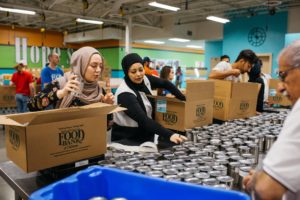 Service. Every year, the Oklahoma Muslim community comes together during the month of Ramadan to spend an afternoon helping those who face the challenge of food insecurity, while they themselves abstain from food and drink. According to the Regional Food Bank in Oklahoma, one in six adults and one in four children in Oklahoma have inconsistent access to healthy food. The path to ending hunger in Oklahoma comes from working together, and by hosting this annual day of service, CAIR Oklahoma hopes to encourage the Muslim community to be present year-round to volunteer and give back to those in need.
Service. Every year, the Oklahoma Muslim community comes together during the month of Ramadan to spend an afternoon helping those who face the challenge of food insecurity, while they themselves abstain from food and drink. According to the Regional Food Bank in Oklahoma, one in six adults and one in four children in Oklahoma have inconsistent access to healthy food. The path to ending hunger in Oklahoma comes from working together, and by hosting this annual day of service, CAIR Oklahoma hopes to encourage the Muslim community to be present year-round to volunteer and give back to those in need.
News coverage of the Ramadan Day of Service events throughout the years
The Oklahoman – Oklahoma Muslims Mark Ramadan With Day of Service at Food Bank
Oklahoma Muslim Day at the Capitol
Muslim Day at the Capitol is one of the most meaningful and important events CAIR Oklahoma hosts. Beginning in 2014, Muslim Day at the Capitol has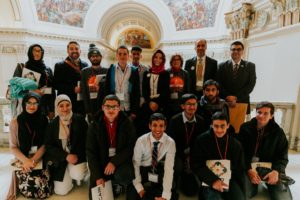 brought hundreds of Oklahoma Muslims of all ages to meet with elected leaders, learn about the legislative process, and actively engage in civic participation.
brought hundreds of Oklahoma Muslims of all ages to meet with elected leaders, learn about the legislative process, and actively engage in civic participation.
In 2019, for the first time in the history of MDAC, the Governor of Oklahoma came in to acknowledge the event, surprising attendees with an unexpected visit to the Senate Chamber during a keynote session to greet the community and welcome them to the people’s house. Each year, MDAC panels and workshops highlight a variety of issues facing Oklahoma’s diverse communities, including poverty, firearm safety, racism, and incarceration, reminding us that although the issues and struggles of each other community may differ, we are all connected and one issue always feeds into others.
The events also serves as an opportunity to highlight and appreciate the work of allies and community partners, such as the Oklahoma Conference of Churches, the Interfaith Alliance, and many other friends of the Oklahoma Muslim community, with citations awarded by state representatives or senators.
News coverage of the Oklahoma Muslim Day at the Capitol throughout the years
The Oklahoman – Oklahoma Muslims Return to State Capitol for Day of Advocacy
The Oklahoman – Muslims Applaud Absence of Protesters for ‘Day at the Capitol’ effort
The Oklahomans – Oklahoma Governor Welcomes Muslims to ‘Day at the Capitol’
Connecting Community Through Ramadan Iftars
Muslim organizations across the state have hosted Ramadan iftars to connecting culture and faith communities in Oklahoma for more than two decades. The Islamic Society of Tulsa has hosted their Look-in on Ramadan event at neighboring Peace Academy for their non-Muslim neighbors to learn more about the holy month of Ramadan and experience a halal iftar dinner. CAIR Oklahoma has hosted the Annual Ramadan Iftar with Elected Officials since 2015 with dozens of elected officials from all levels of Oklahoma government attending each year.
Oklahoma Muslim Women for Humanity
Find out more about Oklahoma Muslim Women for Humanity at their Facebook page: https://www.facebook.com/Oklahoma-Muslim-Women-for-Humanity-408969472799080/
A group of Muslim women based in Oklahoma City, motivated by their faith and the desire to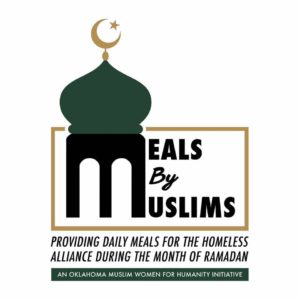 use their resources for the betterment of Oklahoma, produced Oklahoma Muslim Women for Humanity in 2016. This organization’s mission is defined as serving humanity irrespective of race, ethnicity, religion, gender, or age to strengthen [the] Oklahoma community. Starting in 2017, this group decided to spend the month of Ramadan by immersing themselves in a project that provides food for the less fortunate. Through the “Meals by Muslims” Ramadan outreach program, a partnership was formed with the Homeless Alliance of Oklahoma City that has resulted in the meals being paid for and served by volunteers from the Muslim community.
use their resources for the betterment of Oklahoma, produced Oklahoma Muslim Women for Humanity in 2016. This organization’s mission is defined as serving humanity irrespective of race, ethnicity, religion, gender, or age to strengthen [the] Oklahoma community. Starting in 2017, this group decided to spend the month of Ramadan by immersing themselves in a project that provides food for the less fortunate. Through the “Meals by Muslims” Ramadan outreach program, a partnership was formed with the Homeless Alliance of Oklahoma City that has resulted in the meals being paid for and served by volunteers from the Muslim community.
Surayya Anne Foundation
Learn more about the Surayya Anne Foundation here: https://www.surayyaannefoundation.org/
The Surayya Anne Foundation project started over a conversation at a kitchen table. A group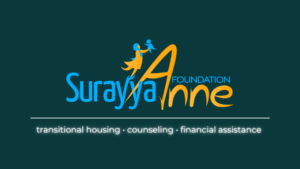 of women who were involved in many projects in the Tulsa Muslim community were discussing various needs from their perspective in the growing community. The discussion opened with the specific needs of female Muslim inmates that were re-entering the community after incarceration. However, after a short time, it became clear that there were many women, facing various degrees of difficulty due to life transitions, that needed help.
of women who were involved in many projects in the Tulsa Muslim community were discussing various needs from their perspective in the growing community. The discussion opened with the specific needs of female Muslim inmates that were re-entering the community after incarceration. However, after a short time, it became clear that there were many women, facing various degrees of difficulty due to life transitions, that needed help.
One month after this first conversation, the same group of women gathered for a brainstorm session to come up with ideas about how to meet the needs of the Tulsa female Muslim community. It was at this meeting that the group was introduced to the works of a woman from Turkey who was the spiritual driving force behind the womens’ programs for a foundation in Istanbul: Surayya Anne, or Mother Surayya. It was her spirit, drive, dedication to the needy, and compassion for all human beings that became the example of things that could be done in Tulsa with a lot of hard work and dedication.
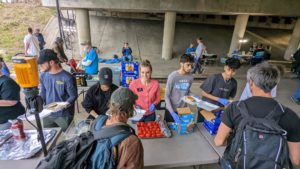 It was one month later, in October 2007, that the foundation took form and a list of priorities was developed. That same month the 501(c)(3) status was applied for and by January 2008 the foundation was well on its way. It was decided at inception that the foundation would focus on Muslim women and children who were homeless, faced chronic or long-term illnesses, faced separation from families and spouses for whatever reason, and were returning to society from incarceration.
It was one month later, in October 2007, that the foundation took form and a list of priorities was developed. That same month the 501(c)(3) status was applied for and by January 2008 the foundation was well on its way. It was decided at inception that the foundation would focus on Muslim women and children who were homeless, faced chronic or long-term illnesses, faced separation from families and spouses for whatever reason, and were returning to society from incarceration.
The foundation has always had a priority to the Muslim community due to the fact that they had a clientele that had many special considerations including diet and daily life, however, it was always understood that anyone; regardless of race, religion, or creed; would be considered for their services. The foundation has proudly been able to maintain this standard to this day, and for that reason it has never been designated as a religious organization: it is a humanitarian organization.
In 2009, the Surayya Anne Foundation opened its first “shelter” apartment. Over the years, apartments have been added as needed and today there are eight apartments providing 12 bedrooms and housing up to 24 clients at one time, used to meet the needs of women and children in the Tulsa community. Also, the foundation has seen continuous growth in the number and scope of programs. It is their sincere hope that they will be able to expand and continue the good work that has been established in the coming years.
Surayya Anne Foundation of OKC
View the website for the Surayya Anne Foundation of OKC at https://www.surayyaanneokc.org/
The Surayya Anne Foundation of Oklahoma City opened its doors in February of 2016 to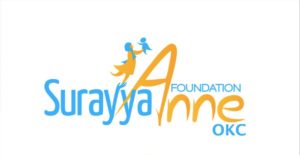 expand the mission of the Tulsa-based organization to address the needs of the Oklahoma City metro area in similar ways. Through partnerships with other organizations and communities, the organization assists women and children through a variety of humanitarian efforts to live sustainable and independent lives.
expand the mission of the Tulsa-based organization to address the needs of the Oklahoma City metro area in similar ways. Through partnerships with other organizations and communities, the organization assists women and children through a variety of humanitarian efforts to live sustainable and independent lives.
Their assistance programs are based on case-by-case needs in a variety of areas, which include but are not limited to case management, emergency assistance, eviction prevention, bill pay assistance, financial education, and job skills training. The mission of the Surayya Anne Foundation of Oklahoma City is to serve and empower those in disadvantaged situations, and they have the vision to be the leading Muslim women’s organization to eliminate homelessness, poverty, and hunger.
Oklahoma Muslims Aid in Tornado Relief Effort
In 2013, one of the deadliest tornados to ever hit the state of Oklahoma ravaged through cities and towns, leaving 24 dead and hundreds without shelter or immediate access to food, medicine, or clothing. Knowing the urgent need of so many Oklahomans, the Muslim youth of Tulsa and Oklahoma City coordinated with CAIR Oklahoma to collect water, household items, medicine, diapers, formula, and more. Within just a few days, the Oklahoma Muslim community had collected enough supplies to fill a 14-foot-long U-haul truck and a minivan. They then donated the supplies to the American Red Cross at a drop-off location in Moore, Oklahoma. Additionally, several Muslim-run organizations spent weeks in Oklahoma working alongside other organizations to aid in the cleanup efforts. The Islamic Circle of North American (ICNA) Disaster Relief Team, along with Islamic Relief USA, were among the organizations present.
Mercy Mission Building
In 2015, The Islamic Society of Greater Oklahoma City purchased a building adjacent to its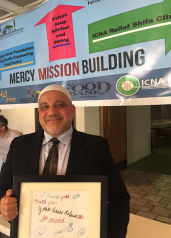 mosque and turned into a new community outreach center. The building currently houses the Mercy Food Pantry, in partnership with the Regional Food Bank of Oklahoma and Islamic Relief. Additionally, the building houses ICNA Relief’s Shifa Clinic, which is open every week to provide medical services to those who do not have health insurance. Surrayya Anne Foundation OKC also opened their offices there to provide resources for women and children in need, including diapers, formula, clothing, vouchers, job training, and more.
mosque and turned into a new community outreach center. The building currently houses the Mercy Food Pantry, in partnership with the Regional Food Bank of Oklahoma and Islamic Relief. Additionally, the building houses ICNA Relief’s Shifa Clinic, which is open every week to provide medical services to those who do not have health insurance. Surrayya Anne Foundation OKC also opened their offices there to provide resources for women and children in need, including diapers, formula, clothing, vouchers, job training, and more.
Read an article from The Oklahoman on on the dedication of the Mercy Mission Building as a community outreach center: https://www.oklahoman.com/story/news/religion/2015/10/10/islamic-society-of-greater-oklahoma-city-dedicates-new-community-outreach-center/60717556007/
What is Islamophobia?
According to Islamophobia.org: Islamophobia is fear, hatred, or prejudice toward Islam and Muslims that results in a pattern of discrimination and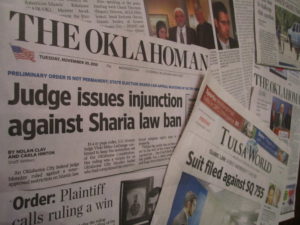 oppression. Islamophobia creates a distorted understanding of Islam and Muslims by transforming the global and historical faith tradition of Islam, along with the rich history of the cultural and ethnic diversity of its adherents, into a set of stereotyped characteristics most often reducible to themes of violence, civilizational subversion, and fundamental otherness. Islamophobia must also be understood as a system of both religious and racial animosity that is perpetuated by private citizens as well as cultural and political structures.
oppression. Islamophobia creates a distorted understanding of Islam and Muslims by transforming the global and historical faith tradition of Islam, along with the rich history of the cultural and ethnic diversity of its adherents, into a set of stereotyped characteristics most often reducible to themes of violence, civilizational subversion, and fundamental otherness. Islamophobia must also be understood as a system of both religious and racial animosity that is perpetuated by private citizens as well as cultural and political structures.
Read the 2022 Report: Islamophobia in the Mainstream
What Is It?
In short, Islamophobia is anti–Muslim racism.
At length, Islamophobia is a fear, hatred, or prejudice toward Islam and Muslims that results in a pattern of discrimination and oppression. Islamophobia creates a distorted understanding of Islam and Muslims by transforming the global and historical faith tradition of Islam, along with the rich history of cultural and ethnic diversity of its adherents, into a set of stereotyped characteristics most often reducible to themes of violence, civilizational subversion, and fundamental otherness. Islamophobia must also be understood as a system of both religious and racial animosity that is perpetuated by private citizens as well as cultural and political structures.
Who is Affected?
In addition to Muslim women, men and children, those who share characteristics that have been racialized as “Muslim” – whether it be language, clothing or skin color – are also affected by Islamophobia. Thus, Sikhs, Christian Arabs, and Hindu Indians have been targets of anti-Muslim animus.
How Is It Manifested?
Islamophobic sentiment utilizes ideas which dehumanize Muslims and their heterogenous cultures, beliefs, customs and practices and deny the dynamic nature of Islam.
Islamophobic acts occur at both an individual and institutional level and can take many forms. They may be physical attacks against those perceived to be Muslim or the damage and desecration of mosques and Islamic centers. They include law enforcement profiling, discrimination in employment and denials of service. Islamophobic acts can also take the form of anti-Islam legislation and policy measures.
Islamophobic rhetoric expressed by individuals and political and media institutions can include verbal harassment, intimidation and hate speech.
Where Does It Come From?
It is possible to point to five sources of contemporary Islamophobia:
- Media representation: The U.S. media overemphasizes negative coverage and news pertaining to Muslims and Islam leading to an exaggerated sense of threat, and consequently fear and hate. An academic study covered by The Washington Post found that in a four-year period, 12 percent of domestic attacks conducted by Muslims received, on average, 449 percent more media coverage than 88 percent of attacks committed by others.
- Political rhetoric: Politicians play on people’s emotions and exploit their fear to actively instigate Islamophobia when it serves their own political interests.
- Violent extremists: Although violent groups like ISIS target and murder more Muslims than any others, these groups continue to color American perceptions of Islam and all Muslims.
- American foreign policy: Islamophobia is frequently utilized by the U.S. to justify its foreign policy in Muslim-majority regions of the world. Consider President George W. Bush’s failed War on Terror, which decimated Iraq. The policy was presented to the American public as essential for freedom and safety.
- U.S. Islamophobia Network: An influential, multi-million dollar network of groups and individuals in the U.S. who falsely cast Islam and Muslims as a malevolent existential threat, and work actively to promote prejudice, discrimination, and oppression towards the faith and its practitioners.
Oklahoma Muslims and Islamophobia
- A 2015 study found that anti-Islam groups had access to $205 million in total revenue between 2008-2013.
- During the course of 2015, there were about 174 reported incidents of anti-Muslim violence and vandalism, including 12 murders, 29 physical assaults, and 9 shootings or bombings.
- 2015 saw 78 recorded incidents in which mosques were targeted. In November and December 2015, there were 17 mosque incidents – almost equivalent to an entire year’s worth of reports in both 2013 and 2014.
- The EEOC reports that since 2001, Muslims consistently represent around 20% of religious discrimination claims and between 7-9% of national origin-related discrimination claims.
- In 2017, the FBI reported that 18.7% of anti-religious hate crimes were motived by anti-Muslim bias.
Anti-Muslim hate crime are 6-9 times more common today than they were before 9/11.
What Do People Think About Islam and Muslims?
- Nearly 1/3 of the country believes that Muslims should be barred from running for president.
- A 2010 TIME report showed that 28% of voters don’t believe that Muslims should be eligible to sit on the Supreme Court.
- 33% of Americans would not be okay with a mosque in their area.
- Fewer than 40% of Americans say they actually know a Muslim.
- 56% of Americans think Islam is at odds with American values and 49% think that at least some Muslims are anti-American.
- 70% of Republican voters and 26% of Democratic voters say that Islam is more likely to encourage violence among its believers.
- Around 1/3 of Americans surveyed by Reuters said that the Muslim ban made them feel more safe.
- 6 in 10 Americans say they seldom or never had an interaction with a Muslim.
Muslim Civil Rights in Oklahoma
Examples of Islamophobia in Oklahoma
- In May 2018, the Tulsa County Sheriff’s Department denied entry to the Tulsa County Courthouse to a Muslim woman in hijab until she agreed to remove her hijab in a parking lot, in full view of male security staffers in violation of her religious beliefs.
- In 2016, a gun range and survival gear store in Oktaha, OK, declared itself a “Muslim free zone” and refused service to a Muslim-American Army reservist.
- When CAIR Oklahoma announced its intentions to march in the 2015 Veterans Day Parade, social media threats included calls to “get on the roof and start “shooting” and to throw bacon on participants.
- An Edmond family was terrorized in 2015 as they tried to enjoy a pre-dawn Ramadan meal by a man threatening to “rip those fucking hijabs off.”
- On October 25, 2016, Rep. John Bennett(R-Sallisaw) held a public hearing in which he called CAIR Oklahoma Director Adam Soltani and Imam Imad Elchassi of the Islamic Society of Greater OKC terrorists, called CAIR Oklahoma staff “suit -wearing jihadis” and promised to try and shut down CAIR Oklahoma.
- At the 2017 day Muslim Day at the Capitol, Muslim schoolchildren seeking to meet with Rep. John Bennett were instead presented with a sheet of “Questions about Islam” from anti-Muslim group Act for America including questions such as “Do you beat your wife?” and “Have you ever decieved a kafir?”
- In December 2016, vandals dumped a pig carcass in the parking lot of the Islamic Center of Lawton.
- In 2013, the Islamic Society of Stillwater had its windows shot out by an unknown perpetrator.
- In May 2016, a Bangladeshi clerk in a Savanna, Oklahoma gas station was stabbed by an attacker calling him a “terrorist.”
- In June 2016, Rep. Pat Ownbey posted on Facebook that “Islam is not a religion subject to First Amendment protection” and continued by calling for a “final solution.”
- CAIR Oklahoma documented a local woman who, in 2014, was asked to sign an anti-Muslim petition asking that all Muslims “go home.”
- In Tulsa, Lebanese-American Khalid Jabara was murdered in 2016 by his neighbor after a year of anti-Arab, anti-Muslim threats against himself and his family.
- In December 2018, Jenan Ayesh and her family were vacationing in Dallas, TX, when a stranger verbally abused and physically assaulted her because she wore a hijab.
- Air Force Veteran Saddiq Long was secretly placed on a no-fly list in 2012, which prevented him from returning to his Oklahoma family and ailing mother. Due to the legal repercussions of his no-fly status, he was detained in Turkey in December 2016 and subsequently smeared by a fabricated claim he was an ISIS member.
- A Tulsa Muslim woman was barred from entering a Valley National Bank branch in 2012 because of the bank’s “no hats, no hoods” policy. Subsequent actions resulted in a policy change that addressed religious head coverings including hijabs, turbans, and yarmulkes.
- Samantha Elauf’s complaint that she was denied a job at a Tulsa retail store because of her hijab went all the way to the US Supreme Court in 2015, resulting in a ruling that protected the rights of religious employees to accommodations for religiously-mandated clothing.
Conclusion
At the heart of Islam is peace. Woven into the very fabric of the word itself, peace is a central tenet of the world’s fastest growing and most diverse religion. Muslims promote peace personally and collectively through the daily practice of their faith through prayer, fasting, and other religious traditions. Peace is also sought through loving one’s neighbor, through acts of services to the community. Muslim-run food pantries and medical clinics feed the hungry and heal the sick, using professional expertise and the guidance of theology that emphasizes the value of each human life, regardless of race, creed, or circumstance.
Islam is feared by a significant swath of the American population. Fewer than 4 in 10 Americans say they know a Muslim personally, and even fewer have any depth of understanding of religion and its long history in America. Despite the prevalence of hatred and fear based on misinformation about their faith, however, Muslims continue to bravely persevere in living their faith publicly. From the earliest day of statehood to our path forward into the future, Oklahoma Muslims continue to serve in their country and their neighbors in love and humility.
Although there are still many myths and misconceptions surrounding Islam and Muslims, we hope that this guide will serve as a resource to halt the spread of Islamophobia and to broaden the public’s understanding of what it means to be a Muslim in Oklahoma.

